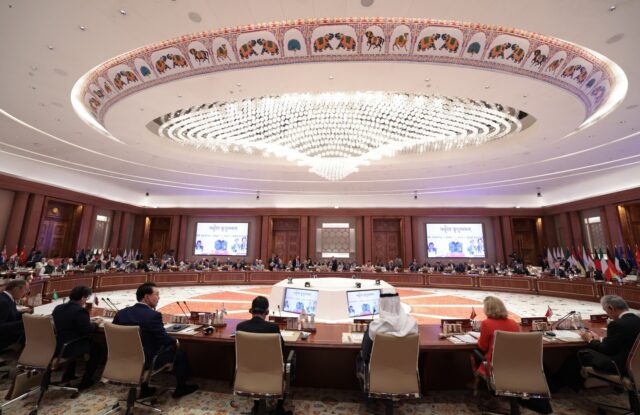NEW DELHI: India chalked up two major wins as the G20 summit entered its final round in New Delhi on Saturday. First, a way around the prickly and highly divisive issue of Ukraine resulting in the joint declaration, and the inclusion of the African Union as the 21st member of the group.
The declaration stopped short of condemning Russia for the invasion of Ukraine last year, the compromise statement seen as a victory for the summit’s host Prime Minister Modi.
“All states must refrain from the threat or use of force to seek territorial acquisition,” the declaration said without singling out Russia by name. It acknowledged deep fractures on the issue among the G20 nations saying “there were different views and assessments of the situation”.
But US NSA Jake Sullivan said: “It does a very good job of standing up to the principle that states cannot use force to seek territorial acquisition”.
He also had a good word for India, describing it as a “significant milestone for India’s chairmanship and a vote of confidence that the G20 can come together to address a pressing range of issues.”
External Affairs Minister S Jaishankar underscored India’s position: “While noting that the G20 is not the platform to resolve geopolitical and security issues, the leaders recognised that they can have significant consequences for the global economy. In particular, they dwelt on the ongoing war in Ukraine, and the impact it has had on developing and least developing nations still recovering from the pandemic and economic disruption. The three Fs, Food, Fuel and Fertilisers, were issues of special concern…”
Asked about the levels of participation and the absence of Presidents Xi and Putin, Dr Jaishankar said: “It is for every country to decide at what level they would be represented. I don’t think one should overly read meanings into it, what I think is important is what is the position that country has taken and how much it has contributed to the deliberations and outcomes. And all the G20 members, including China, were extremely supportive about ensuring that this document was adopted with a 100 per cent consensus.”
Another major leg-up for India was the inclusion of the African Union into the G20. As Modi put it: “In keeping with the sentiment of sabka saath (with everyone), India had proposed that the African Union should be given permanent membership of the G20. I believe we all are in agreement on this proposal.”
India, which sees itself as a leader of the Global South, has been aggressively lobbying for the inclusion of the 55-member AU after taking over the G20 presidency in November last year. The G20 members—Argentina, Australia, Brazil, Canada, China, France, Germany, India, Indonesia, Italy, Japan, South Korea, Mexico, Russia, Saudi Arabia, South Africa, Turkey, the UK, the U.S. and the European Union (EU) —account for around 85 per cent of the world’s GDP, almost 80 per cent of global trade and approximately two-thirds of the world’s population.
The inclusion of the AU may not significantly boost those figures but it underscores the potential of Africa both as a market and a source of critical raw materials. It also reinforces India’s position as a voice of the developing nations whose concerns were usually not addressed by the G20.
Hassled about being on the road in Delhi/ NCR with G20 restrictions in force? Mappls app will suggest alternate routes. A Made-in-India alternative to Google Maps with real-time route closure and diversion solutions in collaboration with Delhi Police.
Click on the link below
G20 – Delhi Controlled Zones Interactive Map
Also see:
















